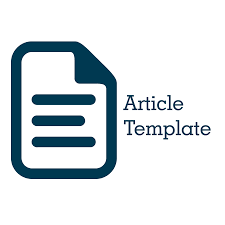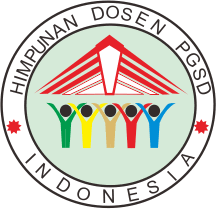Hubungan keterampilan metakognitif dengan pemahaman konsep operasi hitung bilangan peserta didik kelas IV sekolah dasar se-gugus III kecamatan banjarsari
Abstract
Keywords
References
[1] S. Galuh, S. B. Kurniawan, & T. Budiharto, “Analisis Kesalahan Peserta Didik Dalam Menyelesaikan Soal Cerita Matematika Tentang Operasi Hitung Pecahan Kelas V Sekolah Dasar,” Didakt. Dwija Indria, vol. 10, no. 6, pp. 3–8, 2022.
[2] Rival, S., & Abdul, R, “Pelatihan Pembuatan Media Pembelajaran Matematika Untuk Pemahaman Konsep Dasar Matematika Bagi Mahasiswa Jurusan S1 Pendidikan Guru Sekolah Dasar,” J. Pendidik. Masy. dan Pengabdi. DIKMAS, vol. 3, no. 1, pp. 57–68, 2023.
[3] D. S. Amalia, J. Indrastoeti, and S. Poerwanti, “edukasi untuk meningkatkan pemahaman konsep matematika tentang pecahan pada siswa kelas III sekolah dasar,” Didakt. Dwija Indria, vol. 13, no. 1, pp. 23–28, 2025.
[4] Heather C. & Hill, D. L. B., “Unpacking Pedagogical Content Knowledge: Conceptualizing and Measuring Teachers’ Topic-Specific Knowledge of Students,” J. Res. Math. Educ., vol. 39, no. 4, pp. 372–400, 2008.
[5] N. Anditiasari, “Analisis Kesulitan Belajar Abk (Tuna Rungu) Dalam Menyelesaikan Soal Cerita Matematika,” Mathline Jurnall Mat. Dan Pendidik. Mat., vol. 5, no. 2, pp. 183–194, 2020.
[6] Nurishlah, L., Saepuloh, & Muchammad, R. S., “Metakognitif Siswa Sekolah Dasar,” J. Murabbi, vol. 2, no. 1, pp. 48–53, 2023.
[7] P. R. Pintrich, “A Conceptual Framework for Assessing Motivation and Self-regulatingLearning in College Students,” Educ. Psychol. Rev., vol. 16, no. 4, pp. 385–407, 2004.
[8] Kusuma, A. S., & Baskara, Z. W., “Hubungan Metakognitif dengan Pemahaman Konsep Mahasiswa Pada Pembelajaran Menggunakan Model Pemberdayaan Berpikir Melalui Pertanyaan (PBMP),” J. Ilm. Profesi Pendidik., vol. 7, no. 4b, pp. 2704–2712, 2022.
[9] M. Tarwiyani, Ibrohim, & Susriyati, “Penerapan Pembelajaran Sains Berbasis Inquiry Based Learning Terintegrasi Nature of Science dalam Meningkatkan Keterampilan Metakognitif Siswa,” J. Pendidik. Teor. Penelitian, dan Pengemb., vol. 4, no. 10, pp. 1341–1346, 2019.
[10] S. Yuniati, & Sari, A, “Pengembangan Modul Matematika Terintegrasi Nilai-Nilai Keislaman Melalui Pendekatan Realistic Mathematics Education Di Propinsi Riau,” J. Anal., vol. 4, no. 1, pp. 1–9, 2018.
[11] A. Susanto, Teori Belajar dan Pembelajaran di Sekolah Dasar. Prenadamedia Group, 2016.
[12] I. M. D. Atmaja, “Koneksi Indikator Pemahaman Konsep Matematika Dan Keterampilan Metakognisi,” Nusant. J. Ilmu Pengetah. Sos., vol. 8, no. 7, pp. 2048–2056, 2021.
[13] Anindita, K., Khairun, N., & Zulhan, W. B., “Pengaruh Pembelajaran Berpola Pemberdayaan Berpikir melalui Pertanyaan (PBMP) terhadap Pemahaman Konsep dan Keterampilan Metakognitif Mahasiswa S1 PGSD Universitas Mataram,” J. Ilm. Profesi Pendidik., vol. 6, no. 1, pp. 151–158, 2021.
[14] Andini, L., “Analisis Korelasi Keterampilan Metakognitif dan Minat Belajar terhadap Hasil Belajar Siswa pada Materi Kesetimbangan Kimia,” J. Kependidikan, vol. 7, no. 2, pp. 472–480, 2021.
[15] C. Balcikanli, “Metacognitive Awarenes Inventory for Teacher (MAIT),” Electron. J. Res. Educ. Psychol., vol. 9, no. 3, pp. 1309–1332, 2011, [Online]. Available: https://doi.org/10.25115/ejrep.v9i25.1620
[16] Alin, S, Y., & Pujiastuti, H., “Analisi Pemahaman Konsep Operasi Bilangan Bulat Pada Siswa Kelas Iv Melalui Pembelajaran Daring,” Prim. J. Pendidik. Guru Sekol. Dasar, vol. 11, no. 4, pp. 1072–1080, 2022.
[17] Febriyanto, B., Yuyun, D. H., & Komalasari, O., “Peningkatan Pemahaman Konsep Matematis melalui Penggunaan Media Kantong Bergambar pada Materi Perkalian Bilangan di Kelas II Sekolah Dasar,” J. Cakrawala Pendas, vol. 4, no. 2, pp. 32–44, 2018.
[18] Ery, T. D., & M. Pratiwi, N., “Media Pembelajaran Interaktif ‘KERKABA’ Berbasis Game Edukasi untuk Meningkatkan Pemahaman Konsep Operasi Hitung Perkalian dan Pembagian Bilangan Cacah,” J. Educ. Action Res., vol. 7, no. 4, pp. 518–526, 2023.
[19] H. R. Salma, Riyadi, and S. Wahyuningsih, “Analisis kemampuan berpikir kritis pada materi cerita operasi hitung campuran dalam pembelajaran matematika kelas III sekolah dasar,” Didakt. Dwija Indria, vol. 13, no. 2, pp. 122–127, 2025.
[20] Taufik, A. & Lalu, Y. V, “Kemampuan Metakognisi Berdasarkan Self-Confidence Pada Pemahaman Konsep Matematika,” J. Pendidik. Mat., vol. 14, no. 1, pp. 1–13, 2023.
[21] Saputri, Y. D., Meti, I., & Joko, A., “Hubungan Keterampilan Metakognisi Dengan Pemahaman Konsep Biologi Melalui Model Pembelajaran SSCS,” Proceeding Biol. Educ. Conf., vol. 16, no. 1, pp. 133–138, 2019.
[22] Suwono, H., Susanti, S., & Lestari, U., “Guided inquiry facilitated blended learning to improve metacognitive and learning outcome of high school students,” J. Phys. Conf. Ser., vol. 824, no. 2017, pp. 1–10, 2017.
Refbacks
- There are currently no refbacks.



